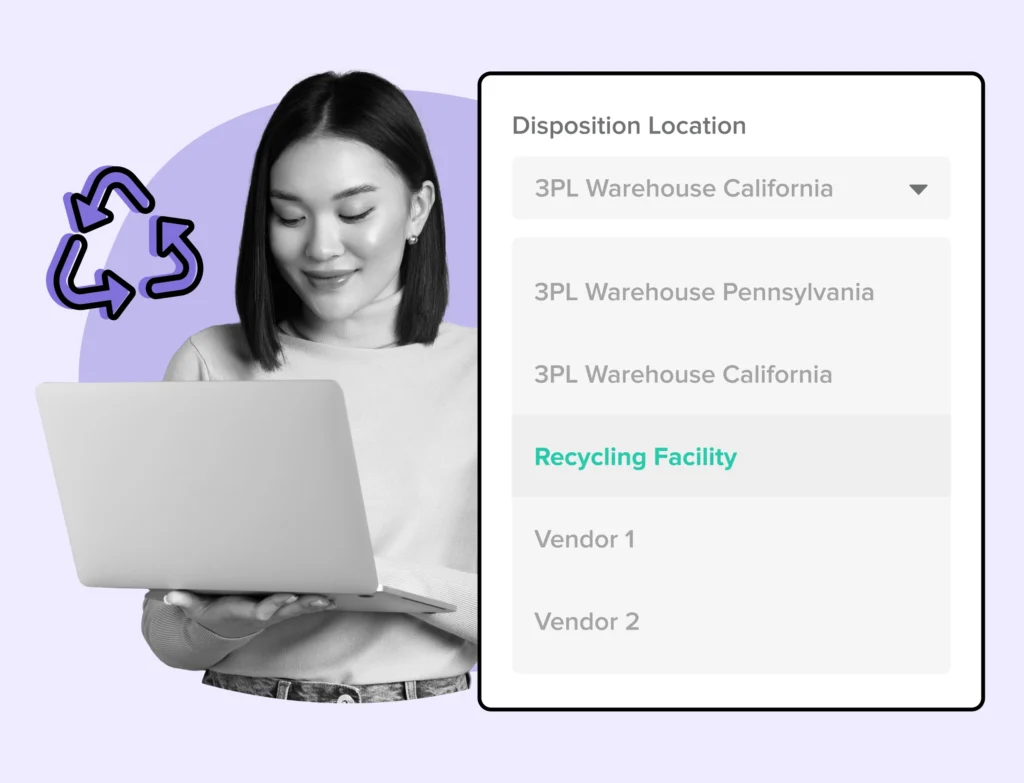
Reduce Holiday Return Costs: Expert Tips for eCommerce Stores
Let’s explore practical strategies to reduce holiday return costs. Learn how to streamline your return process and keep your customers happy!
Shipping, Tracking & Notifications
Boost customer experience and reduce support tickets
Realtime order and shipment tracking
Proactive order and shipping notifications
AI-Enhanced Discounted Labels
Predictive pre-purchase estimated delivery dates
Self-Serivce branded order tracking
Effortless experience delivered
Identify and Resolve Order Issues
Realtime order and shipment tracking
Make returns profitable and delight customers
Flexibility to define any return destinations & conditions
Simplify returns for your customers and team
Incentivize exchanges over returns
Returns management made easy for your team
Returns management made easy for your team
Easy claims and smart upsells
Understand why your customers are returning
In-Store & Curbside Pickup
Unify the online and the in-store experience
Hassle-free pickup experience for customers
In-Store dashboard to keep operations streamlined
In-Store and Online orders unified
Drive foot-traffic to your stores
Shipping, Tracking & Notifications
Boost customer experience and reduce support tickets
Realtime order and shipment tracking
Proactive order and shipping notifications
AI-Enhanced Discounted Labels
Predictive pre-purchase estimated delivery dates
Self-Serivce branded order tracking
Effortless experience delivered
Identify and Resolve Order Issues
Realtime order and shipment tracking
Make returns profitable and delight customers
Flexibility to define any return destinations & conditions
Simplify returns for your customers and team
Incentivize exchanges over returns
Returns management made easy for your team
Returns management made easy for your team
Understand why your customers are returning
In-Store & Curbside Pickup
Unify the online and the in-store experience
Hassle-free pickup experience for customers
In-Store Dashboard to keep operations streamlined
In-Store and Online orders unified
Drive foot-traffic to your stores
Boost customer experience and reduce support tickets
Realtime order and shipment tracking
Proactive order and shipping notifications
AI-Enhanced Discounted Labels
Predictive pre-purchase estimated delivery dates
Self-Serivce branded order tracking
Effortless experience delivered
Make returns profitable and delight customers
Flexibility to define any return destinations & conditions
Simplify returns for your customers and team
Incentivize exchanges over returns
Returns management made easy for your team
Equip your team for precise return checks.
Understand why your customers are returning
Unify the online and the in-store experience
Hassle-free pickup experience for customers
In-Store Dashboard to keep operations streamlined
In-Store and Online orders unified
Drive foot-traffic to your stores
Find the answer to all your questions
Take a step by step trip through our functionality to see how we can improve your ecommerce processes.
Explore the most comon questions about WeSupply
Calculate the ROI that WeSupply can bring you
Request a no strings attached review of your current shopping experience and missed conversion opportunities
Read actionable articles on how to optimize your post-purchase experience and decrease support tickets
Get inspired by stories of how our customers implemented an effortless post-purchase experience
Wondering if WeSupply is a good fit for you? Read through our use cases to see how we can help you increase conversion & improve CX!
A Deep Dive into Top Companies' Order Tracking & Returns Strategy
Find the answer to all your questions
Explore the most comon questions about WeSupply
Calculate the ROI that WeSupply can bring you
Request a no strings attached review of your current shopping experience and missed conversion opportunities
Take a step by step trip through our functionality to see how we can improve your ecommerce processes.
Read actionable articles on how to optimize your post-purchase experience and decrease support tickets
Get inspired by stories of how our customers implemented an effortless post-purchase experience
A Deep Dive into Top Companies' Order Tracking & Returns Strategy
Wondering if WeSupply is a good fit for you? Read through our use cases to see how we can help you increase conversion & improve CX!

Sustainable ecommerce returns help reduce the environmental impact of online shopping. This guide will teach you how to cut waste and carbon emissions, while keeping customers happy. Learn top strategies to make your returns process greener and more efficient.
Embracing sustainable eCommerce returns can significantly reduce environmental impacts, cater to the increasing demand for eco-friendly options, and enhance customer loyalty and satisfaction.
Reducing the environmental footprint of eCommerce returns involves minimizing carbon emissions, addressing waste generation, and cutting down energy consumption through optimized logistics and sustainable practices.
Implementing strategies such as providing detailed product information, incentivizing customers to keep purchases, and ensuring returned items are resold, donated, or recycled can drastically lower return rates and waste.
WeSupply offers sustainable eCommerce returns with features like Returns Analytics, instant store credit, intelligent dispositions, and flexible return rules. Enhance product offerings, incentivize exchanges, and manage returns efficiently through a branded portal, QR code labels, and the Green Returns Initiative. Get started with WeSupply today!
Sustainable eCommerce returns encompass not just minimizing environmental impact but also creating a more efficient and customer-friendly process. As online retailers, acknowledging the role of sustainability in our operations is vital. The rapid growth of eCommerce has raised concerns about environmental impacts, highlighting the need for sustainable practices.
An ecommerce store that embraces sustainable returns practices can:
Lessen their environmental footprint
Cater to the rising demand for eco-friendly choices among online shoppers
Build customer loyalty
Ensure long-term customer satisfaction and retention.
The integration of sustainability into eCommerce operations holds importance for a multitude of reasons. First, it addresses the environmental impact of online shopping. Consumers are increasingly prioritizing eco-friendly packaging and sustainable goods to reduce waste. By 2025, retail eCommerce sales are projected to surpass $1.6 trillion, indicating the immense scale of potential environmental impact.
Moreover, sustainable practices build trust, especially among younger generations who will soon dominate purchasing power in the U.S.. Embracing sustainable practices allows eCommerce businesses to lower their environmental footprint while ensuring consumer convenience. This not only meets consumer demand but also provides a competitive advantage.
The necessity for sustainable practices in returns management is growing rapidly. Consumers demand transparent and sustainable practices in eCommerce, including packaging and carbon emissions. Implementing eco-friendly packaging solutions can help address these concerns.
Ignoring sustainability in returns can harm a retailer’s brand image and push customers away. Conversely, brands that fulfill their sustainability promises will outcompete those making superficial claims. Adopting sustainable returns practices enables businesses to diminish their environmental footprint and attract eco-conscious customers.
The environmental impact of eCommerce returns is significant. In 2022, eCommerce returns contributed up to 24 million metric tons of CO2 emissions. This is a staggering amount that highlights the need for sustainable returns practices.
Moreover, around 9.5 billion pounds of returned products were sent to landfills in 2022. Online shopping returns generate almost three times as many returns as in-store purchases, exacerbating the problem. To address these issues, we must understand the specific environmental impacts of returns, including their carbon footprint, waste generation, and energy consumption.
The carbon footprint of eCommerce returns is a major concern. Here are some key facts:
Returns can add up to 30% of the emissions from the initial delivery.
International shipping of return parcels significantly contributes to global carbon emissions.
International shipping accounts for 3% of the world’s total carbon emissions.
Returned clothing items in the US release as much emissions as 3 million cars annually. To reduce this carbon footprint, businesses can optimize logistics and minimize unnecessary shipments. Addressing these issues can result in a significant reduction in the environmental impact of returns.
The waste generated by returned items is another pressing issue. Online shopping generates almost five times more packaging waste than shopping in physical stores. Moreover, 91% of all plastic packaging waste ends up in landfills or polluting the environment.
Returned products often require additional packaging, contributing to increased waste. In 2022, over 9.5 billion pounds of returned products were sent directly to landfills. To minimize this waste, businesses can implement strategies to resell, donate, or recycle returned items.
The energy consumption involved in the returns process is considerable. Processing returns can take up to three times the initial delivery time, increasing energy consumption. Returned products often need to be cleaned, re-packaged, or repaired, which ramps up the energy required.
Using ground shipping instead of air shipping for returns can significantly reduce carbon emissions and energy consumption. Investing in sustainable infrastructure, such as using clean energy for return processing facilities, can also significantly lower energy consumption.
Reducing returns is crucial for minimizing their environmental impact. One effective strategy is providing comprehensive product information to manage customer expectations better. Another approach is incentivizing customers to keep their purchases, which can reduce return rates.
Ensuring returned items are resold, donated, or recycled is also essential for reducing waste. Embracing these strategies can enable eCommerce businesses to lessen the environmental impact of returns and enhance customer satisfaction.
Accurate and detailed product information is key to reducing return rates. Including information like product weight, dimensions, and materials used on product pages helps in managing customer expectations. Augmented reality (AR) tools allow customers to visualize products, reducing returns by helping them confirm suitability before purchase.
Automating product information management can prevent errors that lead to returns. Providing comprehensive product information can significantly lower the probability of returns for eCommerce stores.
WeSupply’s Returns Analytics empowers businesses to enhance their product offerings by delivering detailed insights into return reasons at the SKU level. Key features include:
These features ensure that product offerings are continually refined to meet customer expectations and reduce return rates.
Returns Analytics for eCommerce Business
Book a quick call with our experts to see how WeSupply can help you: Understand why your customers are returning; Identify the most returned products; Understand why those products are returned; Identify which customers are serial returners; Reduce Return Rate with Actionable Insights; Returns data available in BigQuery.
Incentivizing customers to keep their purchases can effectively reduce return rates. Offering discounts on future purchases or loyalty points can encourage customers to retain their items. Providing store credit for returns instead of cash refunds also reduces the incentive for fraudulent returns.
Referral programs and VIP programs can further motivate customers by offering higher status and increasing rewards. Implementing these incentives can enable eCommerce businesses to encourage repeat business and boost customer satisfaction.
WeSupply can significantly incentivize customers to keep their purchases by offering instant store credit, which encourages exchanges over refunds. This approach helps reduce the average eCommerce return rate, saves sales through exchanges, and boosts the average order value. Key features include:
These strategies not only minimize returns but also enhance customer satisfaction and drive higher sales.
Managing returned items sustainably is essential for reducing waste. Implementing a closed-loop supply chain helps in recycling returned products, minimizing landfill waste. Partnering with third-party logistics providers can efficiently handle returns and ensure items are put back into inventory.
Offering in-store returns allows for immediate inspection and restocking, reducing the environmental impact. Adopting these strategies can enable retailers to guarantee that returned items are resold, donated, or recycled.
WeSupply ensures that returned items are efficiently resold, donated, or recycled through its intelligent dispositions and restocking capabilities during the returns process. By optimizing the handling of product returns, WeSupply helps businesses manage returns sustainably and effectively. Key features include:
These features reduce unnecessary transportation, lower associated emissions, and ensure that returned items are handled in an environmentally responsible manner.
Efficient returns management systems are crucial for enhancing customer satisfaction and streamlining operations. Some ways to achieve this include:
Implementing automated systems and tools to reduce the time and effort required for returns processing
Leveraging technology to empower eCommerce businesses to lower return rates
Focusing on boosting customer satisfaction through efficient returns processes
Considering sustainability in returns management practices
By implementing these strategies, businesses can improve their returns management processes and ultimately enhance customer satisfaction.
These systems offer analytics to understand return trends and improve product quality and customer service.
Technology plays a vital role in creating sustainable returns management systems. Machine learning and AI can predict return reasons and suggest preventive actions. Virtual sizing technology allows shoppers to virtually ‘try on’ clothing, significantly reducing clothing return rates.
Returns management systems offer analytics to understand return trends and improve product quality and customer service. Embracing these technologies can enable eCommerce businesses to lessen their environmental footprint and improve customer satisfaction.
Streamlining the returns process is essential for efficiency and sustainability. Centralized returns management platforms can consolidate return requests and streamline processing. Automation in the returns process can reduce manual errors and speed up processing times.
Real-time tracking and automated updates can enhance transparency and efficiency in the returns process. Implementing a Returns Management System (RMS) can enable businesses to handle returns more efficiently and cut down associated costs.
WeSupply promotes sustainable eCommerce returns by providing efficient returns management systems that streamline the process and enhance customer satisfaction. Key features include:
Flexible Returns Rules: Tailor return policies to fit various scenarios, ensuring a hassle-free process.
Autogenerated QR Code Return Labels: Simplify returns with QR codes, eliminating the need for printing.
Returns Tracking: Enable customers to track their returns easily and check statuses with just a few clicks.
Post-Purchase Notifications: Use high-open-rate email and SMS notifications to send return shipping updates and personalized offers.
Buy Online, Return In-Store: Enhance convenience by allowing customers to return items in-store.
These features collectively reduce the environmental impact of returns and foster customer loyalty. Book a demo today to see how WeSupply can revolutionize your returns management!
In 2020, the shift to online shopping due to COVID-19 led to an 11% increase in e-commerce sales but also a spike in return rates, especially in the fashion industry where online return rates can reach up to 50%. Evereve faced significant challenges with manual return processes, lack of visibility, and overwhelmed customer service teams.
To tackle these issues, Evereve partnered with WeSupply, leveraging their Magento & Custom API integrations. This collaboration resulted in an automated returns process managed from a single interface, focusing on proactivity, self-service, and return flexibility.
Big Wins for Evereve:
Cost Savings: Reduced burden on customer service teams and fewer support tickets.
Faster, More Accurate Returns: Enhanced accountability and transparency across teams.
Streamlined Customer Experience: Improved order tracking, notifications, and in-store pick-up capabilities, ensuring customer satisfaction and guaranteed sales.
Evereve’s new self-service returns process enabled customers to handle returns independently, enhancing customer loyalty and operational efficiency.
WeSupply offers innovative solutions for sustainable eCommerce, promoting environmental responsibility through various initiatives. Their solutions include the Green Returns Initiative, Buy Online Return In Store feature, and automated return label generation, all designed to minimize the environmental impact of returns.
Adopting WeSupply’s solutions can enable eCommerce businesses to simplify their returns process, cut down on shipping emissions, and boost customer satisfaction. These initiatives not only contribute to a more sustainable future but also provide a competitive advantage in the eCommerce space.
WeSupply’s Green Returns Initiative promotes sustainable eCommerce returns by encouraging customers to keep low-cost items when requesting returns, reducing shipping and waste. The initiative also directs damaged products to recycling or repair facilities, further supporting environmental responsibility.
By allowing businesses to refund customers for unwanted items without returning them, the Green Returns Initiative significantly reduces transportation emissions. This approach not only minimizes the environmental footprint but also improves overall customer satisfaction.
The Buy Online, Return In Store feature by WeSupply offers the following benefits for online purchases:
Decreases the need for shipping
Encourages more foot traffic in physical stores
Minimizes environmental impact by cutting down on packaging and shipping requirements for returns.
In-store returns offer several benefits for brick and mortar stores:
They help save on transportation costs
They drive more foot traffic to brick-and-mortar locations, potentially increasing in-store sales
By providing an easy return option for customers, this feature can reduce cart abandonment rates
They enhance the overall customer experience.
WeSupply’s automated return label generation offers the following benefits:
Streamlines the return process
Reduces paper waste through printerless QR code returns
Helps detect the originating warehouse and generates appropriate return labels
Enhances efficiency
Create custom return policies
There are many moving pieces in ecommerce logistics. Book a quick call with our experts to see how WeSupply can help you take control by creating custom policies to handle them all easily. You get to decide how you want to handle final sale items, return window lengths, return request approvals, and more.
WeSupply’s Intelligent Dispositions optimize the handling of product returns by dynamically routing items to the nearest suitable locations, such as warehouses, recycling centers, donation facilities, or outlet stores, based on predefined rules. This system reduces unnecessary transportation and associated emissions, ensuring that returned items are handled in an environmentally responsible manner.
In today’s competitive market, businesses are constantly seeking ways to protect their bottom line while also building trust with their customers. WeSupply offers a robust solution that not only enhances operational efficiency but also contributes to sustainability. Here’s how:
Streamlined Operations: Automates processes, reducing errors and labor costs.
Inventory Management: Maintains optimal stock levels to minimize holding costs.
Returns Management: Simplifies returns, reducing complexity and cost.
Building Customer Trust
Transparency: Real-time updates and notifications.
Consistency: Uniform experience across all touchpoints.
Personalization: Tailored experiences based on customer preferences.
Sustainability
Reduced Carbon Footprint: Optimized logistics and consolidated shipping.
Waste Reduction: Efficient inventory and returns management.
Sustainable Choices: Insights into environmental impact.
Discover how WeSupply can revolutionize your business and begin your path to increased efficiency and trust. Try the ROI Calculator to see your potential savings.
Effective communication of sustainability efforts to consumers is essential for building trust and enhancing customer loyalty. Transparent communication about sustainability initiatives can significantly increase customer confidence and satisfaction.
Crafting clear and transparent return policies, coupled with marketing initiatives and social media engagement, can help businesses promote their sustainability efforts and foster eco-conscious behaviors among customers. This not only helps in building a loyal customer base but also contributes to a more sustainable future.
Clear and transparent return policies are crucial for promoting sustainability efforts. User-friendly online return portals simplify the process for customers and align with sustainable practices. Offering incentives for eco-conscious choices during the return process can also promote sustainable behaviors.
Implementing clear return policies can increase customer trust and satisfaction in sustainability efforts. Including information on refund methods and timelines in the return policy can help manage customer expectations and enhance the overall customer experience.
Implementing clear return policies can increase customer trust and satisfaction in sustainability efforts. Including information on refund methods and timelines in the return policy can help manage customer expectations and enhance the overall customer experience.
WeSupply can help businesses craft clear and transparent return policies that are both flexible and customer-friendly. By leveraging WeSupply’s advanced features, companies can create smart return rules that match all item attributes and set conditions like free return shipping with fully customizable return logics. Key features include:
Set Conditions: Offer free return shipping and other customizable options.
Intelligent Dispositions: Effortlessly sort physical returns for optimal handling.
Pre-built Return Policies: Designed to enhance customer satisfaction and streamline the return process.
If the product is damaged, ship it directly to a recycling or repair facility: Direct damaged products to repair or recycling facilities, promoting environmental responsibility and sustainable practices.
Decrease carbon emissions resulting from returns and exchanges: Implement eco-friendly return and exchange policies to minimize carbon emissions, contributing to environmental sustainability.
These features ensure a hassle-free return policy that enhances customer satisfaction and streamlines the returns process.
Marketing initiatives and social media engagement play a vital role in communicating sustainability efforts to consumers. Social media platforms provide an interactive platform to engage customers and promote sustainability initiatives. Tailoring sustainability messages to each communication channel enhances the impact of marketing initiatives.
Regularly gathering and responding to customer feedback regarding sustainability initiatives helps businesses understand customer needs and preferences. By leveraging these strategies, eCommerce businesses can effectively communicate their sustainability efforts and build a loyal customer base.
Setting and achieving measurable sustainability goals is essential for tracking progress and making continuous improvements. Sustainability involves balancing present needs without compromising future generations’ ability to meet their needs. Adopting sustainable practices can cut costs, build customer trust, and set your brand apart from competitors.
Using SMART goals and frequently reviewing returns data can ensure the clarity, achievability, and effectiveness of businesses’ sustainability initiatives. This not only helps in reducing the environmental footprint but also enhances the overall sustainability of eCommerce operations.
SMART goals in sustainability ensure objectives are:
Specific
Measurable
Achievable
Relevant
Time-bound
Setting SMART goals helps businesses track progress and make necessary adjustments to meet their environmental objectives.
By aligning sustainability initiatives with broader business strategies, ecommerce business owners can ensure their goals are realistic and resource-efficient. This approach enhances the likelihood of successful implementation and contributes to a more sustainable future.
Regularly reviewing returns data is crucial for identifying patterns and implementing strategies to reduce returns. Analyzing returns data enables companies to pinpoint issues like product defects or misleading descriptions.
Frequent analysis of returns data can help businesses optimize their inventory management and reduce costs associated with overstocking returned items. By consistently monitoring returns data, businesses can make informed decisions to improve their returns process and enhance customer satisfaction.
WeSupply’s Returns Analytics empowers eCommerce businesses to regularly review and understand returns data, providing actionable insights to improve operations and customer satisfaction. By leveraging WeSupply’s advanced analytics, companies can:
Identify the Most Returned Products: Pinpoint which items are most frequently returned.
Understand Why Products Are Returned: Gain insights into the reasons behind returns.
Identify Serial Returners: Recognize customers who frequently return items.
Reduce Return Rate: Implement strategies based on data to lower the return rate.
The amalgamation of multiple strategies proves pivotal in maximizing profit margin improvement and securing long-term success within the eCommerce industry. Some key strategies to consider include:
Reducing customer acquisition costs by improving post-purchase nurturing
Leveraging micro-influencers from loyal customers to boost profit margins
Optimizing supply chain processes, such as auditing waste and miscommunication, to enhance eCommerce profitability.
Implementing prepaid shipping and buying packaging materials in bulk are effective ways to reduce shipping costs and improve profitability. Featuring bestsellers prominently and leveraging social proof can increase sales of high-margin products. Creating a compelling loyalty program with tiered rewards based on customer spend can drive incremental revenue growth. Developing a robust cart abandonment strategy can recover lost potential sales, and enhancing customer support consistency can prevent customers from abandoning the purchase process.
By integrating these strategies, eCommerce businesses can achieve higher profit margins and ensure sustainable growth.
WeSupply offers a comprehensive guide to sustainable eCommerce returns, helping businesses refine product offerings, incentivize purchases, and manage returns efficiently. Through Returns Analytics, businesses can identify and address return reasons at the SKU level, adjust sizing charts, update product images, and gather customer feedback. WeSupply incentivizes customers to keep their purchases by offering instant store credit, promoting exchanges, and redirecting customers back to the product catalog. Intelligent dispositions and restocking capabilities ensure that returned items are resold, donated, or recycled sustainably. Additional features include a branded returns portal, self-service returns process, flexible returns rules, autogenerated QR code return labels, returns tracking, post-purchase notifications, and the Green Returns Initiative. Get started with WeSupply today to transform your returns management!
Sustainable eCommerce returns are important because they reduce environmental impact and enhance customer satisfaction by minimizing waste and promoting eco-friendly practices. This helps lower carbon emissions and create a positive shopping experience for customers.
WeSupply’s Green Returns Initiative encourages customers to keep low-cost items, reducing shipping and waste, promoting sustainable returns.
Automated return label generation streamlines the return process, reduces paper waste with QR code returns, and enhances efficiency by generating appropriate return labels.
Intelligent dispositions dynamically route returned items to warehouses, recycling centers, donation facilities, or outlet stores, reducing transportation and emissions.
Yes. WeSupply has an Official Shopify App. You can download it and start integrating with your Shopify Store.
Yes, WeSupply has an official extension for Magento. The WeSupply x Magento integration allows for automating order tracking experiences, reducing customer inquiries, automating shipping email and SMS notifications, and providing a fully branded order tracking experience
Yes, WeSupply has an official BigCommerce App. You can integrate WeSupply with your BigCommerce store to improve your post-purchase customer experience.

Learn How To Create Successful Post Purchase Email Campaigns
Build an effective post-purchase email flow that helps you increase customer satisfaction and drive revenue growth!

Let’s explore practical strategies to reduce holiday return costs. Learn how to streamline your return process and keep your customers happy!

Let’s explore sustainable ecommerce returns solutions, offering strategies to minimize waste, reduce carbon emissions, and save costs!

Let’s dive deep into essential topics like managing profit margins, pricing tactics, improving customer experience, and leveraging data!

Boost ecommerce profit margin: enhance brand awareness, reduce return rates, and optimize inventory management!

Let’s examine potential ways to mitigate the environmental costs tied to the environmental impact of ecommerce returns!

You can boost AOV: practical strategies like exchanges, store credit, and technology used to transform returns into profit opportunities.

Turn your returns process into a strategic advantage: make it efficient, create positive customer experiences, use returns data effectively!

Explore practical strategies for reducing return rates, streamlining the returns process, and enhancing your overall customer experience!

By focusing on the 20% of issues causing 80% of your returns, you can implement targeted strategies for major improvements!